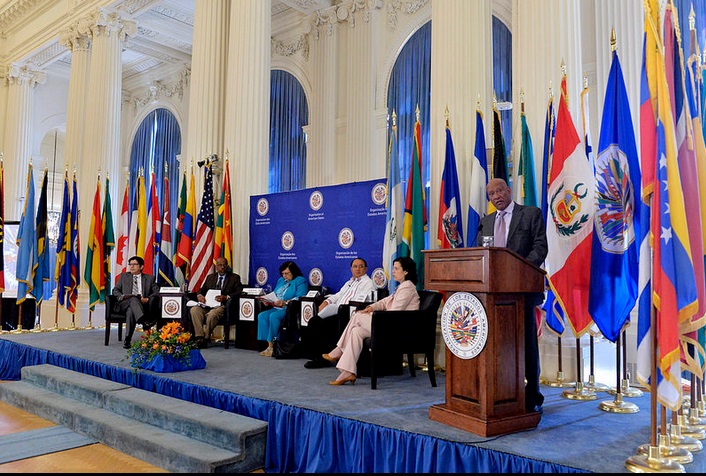
 While “some people are still in disbelief” about the impact of climate change, the long-term scientific data are not in question, the Co-Chair of the United Nations Intergovernmental Panel on Climate Change (IPCC), Vicente Barros, told an OAS forum. “Since 1960 there has been a progressive warming, there is no doubt about it,” he said.
While “some people are still in disbelief” about the impact of climate change, the long-term scientific data are not in question, the Co-Chair of the United Nations Intergovernmental Panel on Climate Change (IPCC), Vicente Barros, told an OAS forum. “Since 1960 there has been a progressive warming, there is no doubt about it,” he said.
Barros was speaking at the 59th OAS Policy Roundtable, held on June 17, which brought together international experts on climate change and high-ranking OAS officials. Many young people were also in the audience, a reflection of growing concern among youth related to the challenges posed by climate change. ECPA and the OAS co-sponsored the forum, called a “Policy Dialogue on Climate Change: Challenges and Opportunities for the Americas.”
Speaking on behalf of OAS Secretary General José Miguel Insulza, Ambassador Hugo De Zela talked about climate change as “an issue that involves governance and public administration, and therefore involves all of us.” While a changing climate naturally affects everyone, “the poor are the most affected,” De Zela said. “You have to keep in mind that climate change will generate conflicts of all kinds and especially cause problems of equity in access to resources.” In June, at the OAS General Assembly in Paraguay, the countries of the region adopted the Declaration of Asunción, in which they resolved “to continue and to strengthen our efforts towards the achievements of commitments made in the area of sustainable development and climate change to counter the adverse effects of climate change.”
At the recent OAS forum, Peru’s Permanent Representative to the OAS, Ambassador Juan Federico Jiménez Mayor, noted that the 2014 United Nations Climate Change Conference (known as COP20) will be held in Lima in December. It will seek to lay the groundwork for an agreement that would make a qualitative leap in worldwide talks to stem global warming—part of a process scheduled to culminate at a 2015 meeting in Paris. The Peruvian diplomat said that “the aim of the Lima meeting will be to serve as a prelude to the Paris meeting, where countries will sign a new protocol leaving behind the Kyoto Protocol,” the only internationally binding document on the issue.
A debate following the presentations included the participation of the Executive Vice President of the National Council on Climate Change of the Dominican Republic, Omar Ramírez Tejada; the Director of Climate Change Research of the Mexican Institute of Ecology and Climate Change (INECC) and member of the IPCC, Cecilia Conde; and the Director of the OAS Department of Sustainable Development, Cletus Springer. During the exchange, Springer said that ECPA serves as an instrument for advancing climate change mitigation and adaptation in the Americas, serving as a regional technical platform for implementing sustainable energy initiatives and technologies that aim to curb carbon emissions.
 View Map
View Map